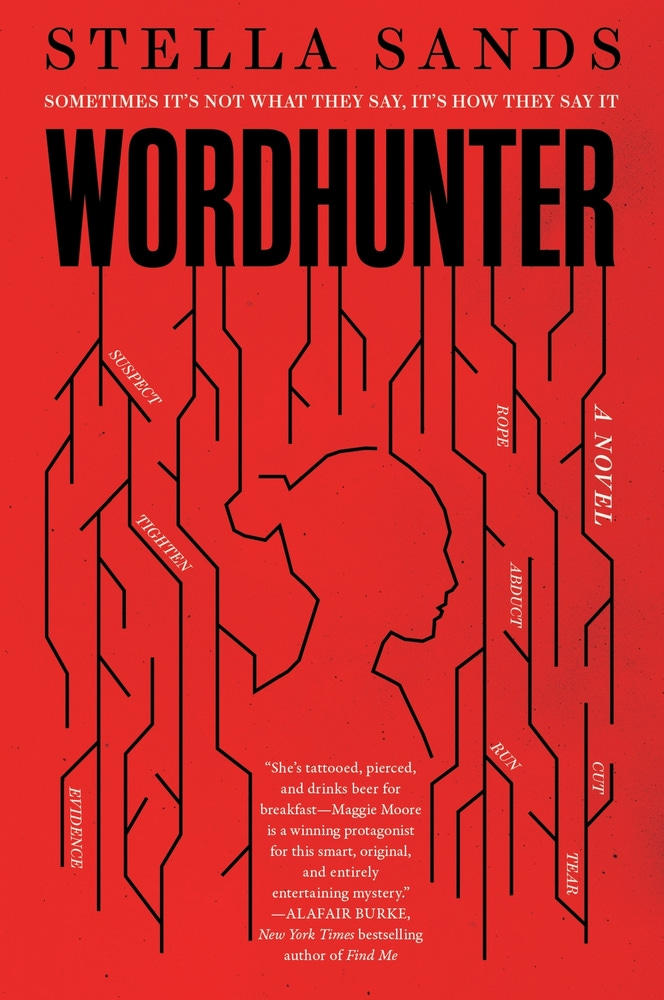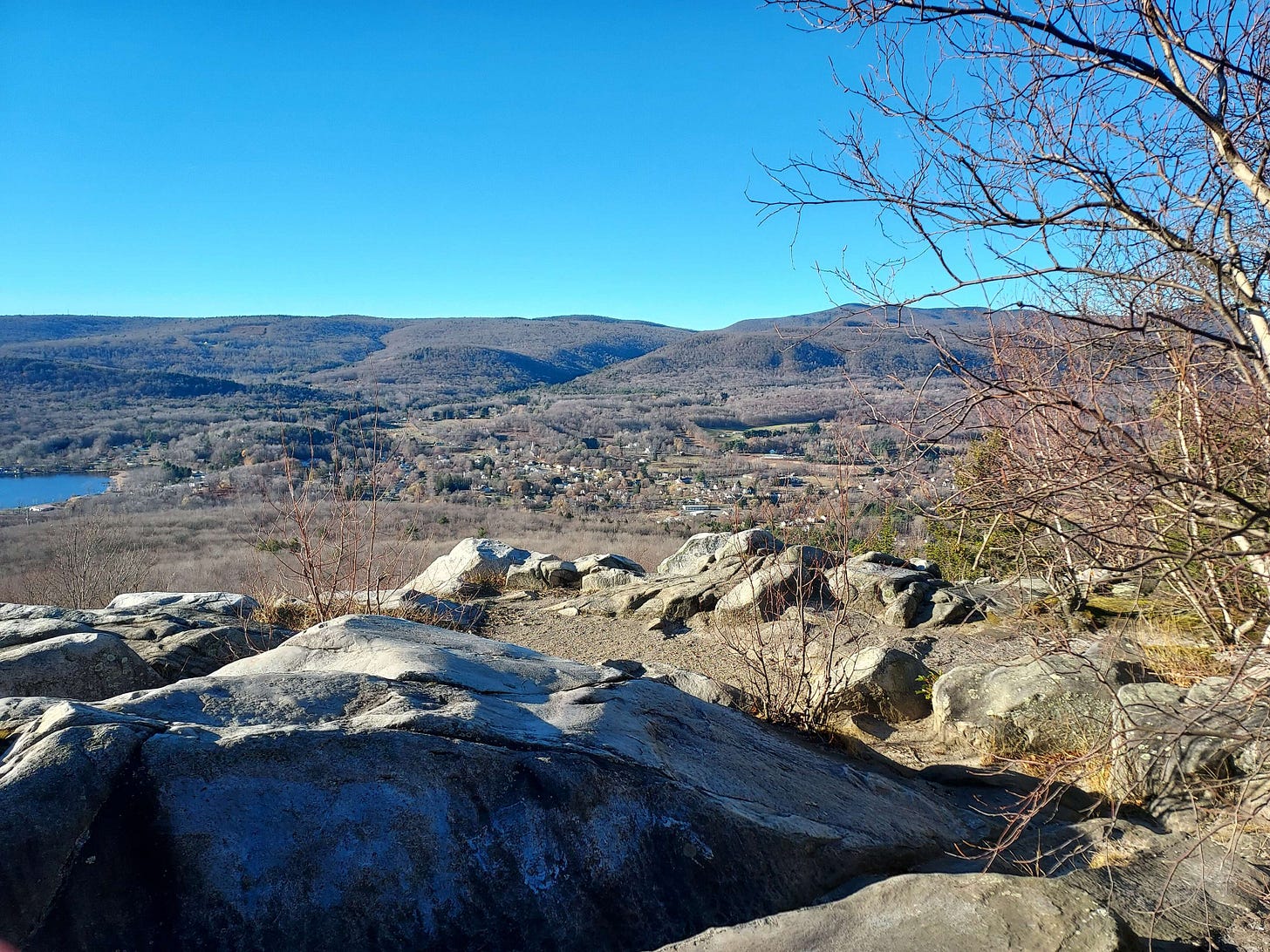Gosh, it’s that time already! It seems as if I wrote less this past week. Partly, I’ve been busy getting the house buttoned up for winter (and wintry mix forecast within a couple days), partly because I got swept up into a cool book.
The book is Wordhunter by Stella Sands, a police procedural (I guess—I’m not up on my crime/mystery subcategories), which I inhaled in less than 24 hours. A fascinating main character who is a college student with a gift for linguistics and sentence diagramming who is helping the police solve a kidnapping in a Florida town. Books like these make me think I need to read way more fiction. Highly recommended.
My wife and I climbed a mile up to a rock outcropping overlooking our town. Here are a couple pictures I took once we got up there.
(Why yes, that IS my thumb. I’d say about 50% of the pictures I take have my fingers in it.)
A couple quotations:
“The world is indeed full of peril, and in it there are many dark places; but still there is much that is fair, and though in all lands love is now mingled with grief, it grows perhaps the greater."
J. R. R. Tolkien, “The Fellowship of the Ring”
[Received via Philosophy Quotes on Substack]
and:
"Idiot took on its current, mentally handicapped designation only after we forgot what the Greeks used it for: an idiotes was an individualist who had no use for society."
Jay Heinrichs -- Aristotle's Guide to Soul Bending ("Five Lost Words")
I haven’t written anything on my Creative Insubordination blog. I’ve been working on my book resources for The Rooted Stage. Let me have a research geekout.
I was reminded of the existence of an AI tool put out in Beta by Google called NotebookLM. What separates this from your usual AI (ChatGPT, Claude, etc) is that, instead of drawing on information from all over the web, you upload up to 50 of your own resources (pdfs, .txt, URL, YouTube videos) up to 1.5M words is my memory. And then you ask questions, and the AI gathers information from the resources you’ve selected from those you’ve uploaded and answers your questions, complete with links to where they found the information. So I uploaded about eight books about 19th century American theater that I had scanned and converted to a txt file—note: I uploaded the entirety of those books), and then got a curated explanation about the transition from resident companies to resident companies working with visiting stars to combination companies to the Theatrical Syndicate monopoly. I even described the difference between “monopoly” and “monopsony” (A monopoly is one seller and many buyers, while a monopsony is one buyer and many sellers) and asked how the Theatrical Syndicate was both. The response, which involved applying the concepts to the data in the resources, was cogent and insightful. I was impressed.
This is not a substitute for actually writing a book—the writing style is pretty turgid, more a bullet list than anything—but as someone who reads a LOT of books when I’m prepping to write, but who often can’t quite remember where I found a particular quotation or idea, NotebookLM saved me a lot of work wracking my brain. Google explicitly claims that any sources you upload will not be used to train its AI model, and while my trust of Google is rather low, I’m choosing to believe them in this case.
Anyway, if I were still teaching, I’d be finding a way to integrate this into my classes. When the internet started to get powerful, I was an early adopter in my classes—I was never one of those professors who tried to keep the internet out of the classroom. Instead, I tried to find ways to utilize them as tools to enhance deep learning. I think AI, if used creatively, could be a great addition to learning. Will students use AI to write papers? Probably, especially after I show them how the tool works. But I’ve never been convinced that my job was to create a classful of students who were great at academic writing. I mean, who cares? What I wanted was students who could pull something interesting from a text and play with it, have a conversation with it, argue with it, and try to figure out whether they want to include the ideas in their lives.
If I were still on campus, I suspect I’d be viewed through narrowed eyes.
I want to shout out one of my former students, Zach Walker, who is a truly amazing theater teacher at Wautauga High School in Boone, NC. Boone was among those who received a great deal of damage during Hurricane Helene. Afterwards, he and his co-director worked with the students to create a devised work called Surge about what happened. “SURGE was written, directed, and produced by Watauga High students as a tribute to the strength and unity shown by the community during Hurricane Helene. The storyline weaves through the chaos and heartbreak brought by the storm, with “the water came so fast” as a haunting and then hopeful refrain from beginning to end, reflecting the sudden floodwaters that devastated the town and then later the flood of relief and community support that followed.”
Finally, another of my students, Brian Santana, has a book coming out about the murder of a Drama major at UNC Asheville back in the 1980s. Entitled Murder on Campus, the book isn’t yet available for pre-order, but you can read an article in UNCA’s student newspaper, The Blue Banner, for more information. I’m looking forward to reading the book, which I believe is scheduled to be released in mid-January.
Congratulations to Zach Walker and Brian Santana!







